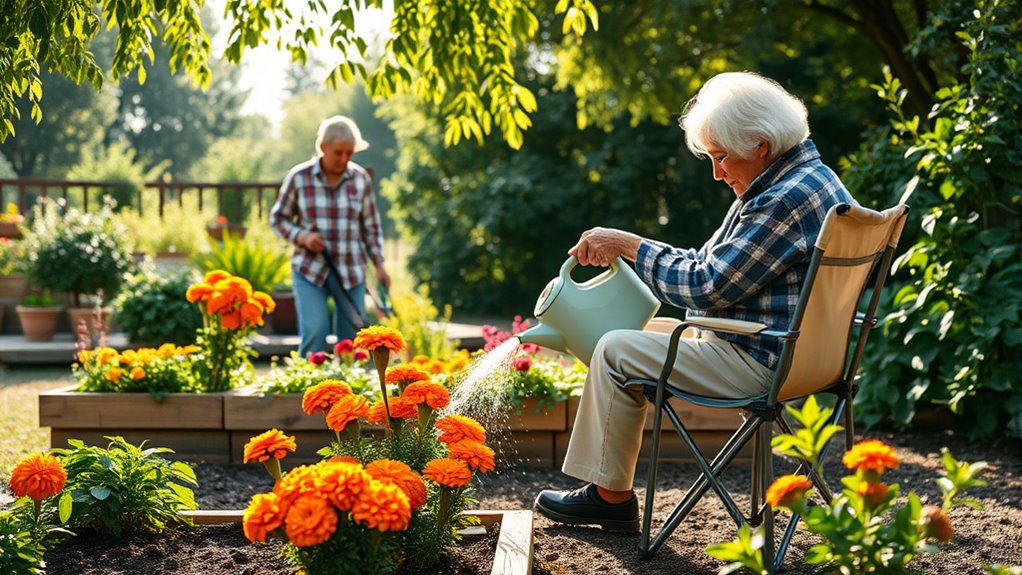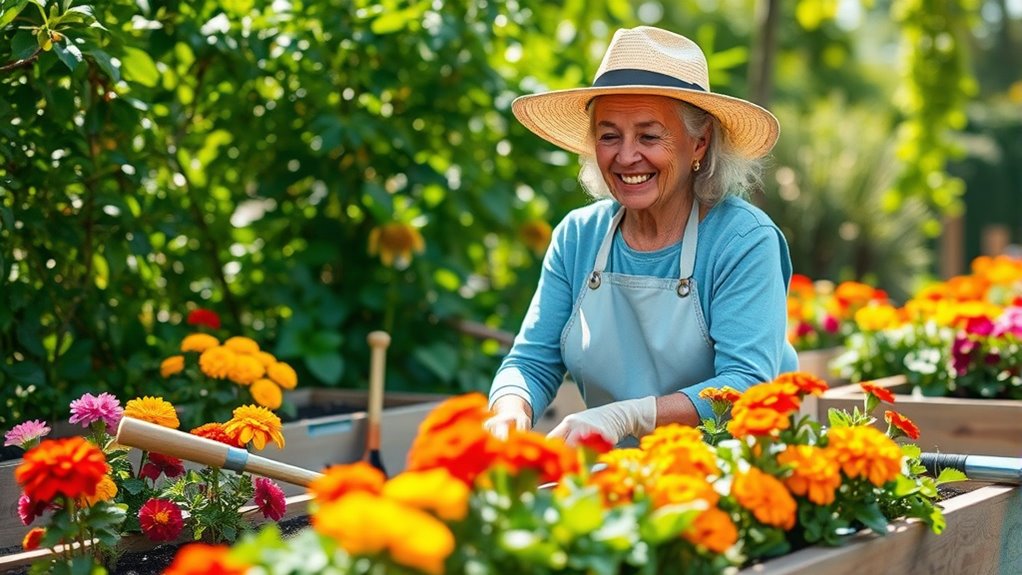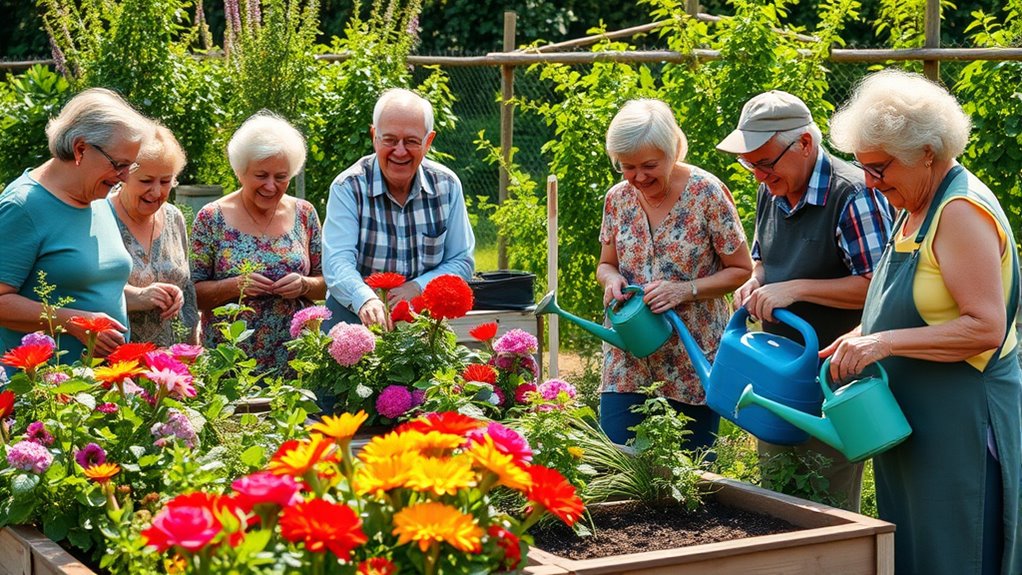Gardening is a wonderful hobby for seniors that boosts physical strength, improves mood, and reduces stress. You can adapt it with raised beds, ergonomic tools, and accessible pathways to suit your mobility and safety needs. Gardening also stimulates your mind and fosters emotional resilience while offering social opportunities in community gardens or group projects. Stay with us to discover how you can make the most of gardening and enjoy its many benefits tailored just for you.
Key Takeaways
- Gardening improves physical health through low-impact exercise, enhances flexibility, balance, and boosts vitamin D levels.
- Adapt gardening techniques with ergonomic tools, raised beds, and accessible pathways for safety and ease of use.
- Choose low-maintenance, suitable plants like herbs, berries, and vegetables to ensure successful and enjoyable gardening.
- Engage in gardening to support cognitive health, reduce dementia risk, and elevate mood through sensory and problem-solving activities.
- Foster social connections and emotional well-being by participating in community gardens, clubs, and shared gardening projects.
The Physical and Mental Rewards of Gardening for Older Adults

Gardening offers numerous physical and mental benefits for older adults, making it an excellent hobby for seniors. Engaging in this activity boosts your physical health by providing low-impact exercise that improves strength, flexibility, and balance, which can help reduce fall risk.
Sunlight exposure during gardening increases your vitamin D levels, supporting bone health and strengthening your immune system as you age. Mentally, tending to plants lowers cortisol levels, reducing stress and promoting relaxation. Proper tools can make gardening safer and more enjoyable for seniors by reducing strain and injury risk.
The nurturing process enhances your self-esteem and gives you a sense of accomplishment, positively impacting your emotional well-being. Additionally, regular gardening has been linked to a significant decrease in dementia risk, supporting cognitive health during the aging process. Research indicates that connecting with nature through gardening can also improve mood and overall mental health. Incorporating air purifiers in your indoor gardening space can improve air quality and create a healthier environment for your plants and yourself.
Using self watering plant pots can further simplify your gardening routine and ensure consistent moisture for your plants, making gardening more accessible and less labor-intensive. Incorporating mindful gardening practices can deepen your connection with nature and enhance the therapeutic benefits of your hobby.
This combination of physical and mental rewards makes gardening a valuable and fulfilling activity for seniors.
Adapting Gardening Techniques to Fit Mobility and Health Needs

As you continue to enjoy the physical and mental benefits of gardening, it’s important to adapt your techniques to fit your mobility and health needs. Using ergonomic tools designed for seniors can reduce strain and make tasks easier. Raised beds and vertical gardening systems lower the need to bend, improving accessibility and comfort. Inserting security measures such as sturdy supports and stable pathways enhances safety and stability. Incorporating state-specific benefits can further support your gardening activities by providing tailored resources and assistance. Container gardening with pots and planters allows you to participate without requiring extensive outdoor space or strenuous effort. Additionally, selecting fresh and healthy plants can maximize your gardening enjoyment and success. Regularly practicing auditory processing techniques can also help maintain mental sharpness and focus during gardening activities. Exploring sound healing science through calming sounds while gardening can promote relaxation and mindfulness.
Selecting Suitable Tools and Plants for Senior Gardeners

Choosing the right tools and plants can make a significant difference in your gardening experience as a senior. Ergonomic tools with supportive grips reduce hand strain and are lightweight, making gardening easier and more comfortable.
For those with mobility limitations, raised beds, large pots, and planters help minimize bending and make planting and harvesting more accessible.
Opt for low-maintenance plants like dwarf fruit trees, berry bushes, and perennials that require less effort and time to care for.
Easy-to-grow vegetables such as lettuce, radishes, spinach, and tomatoes offer quick harvests, encouraging ongoing participation.
Additionally, selecting non-toxic herbs like rosemary, sage, and thyme guarantees safe gardening options, whether indoors or outdoors, and adds pleasure to your gardening routine without extra effort.
Ensuring Safety and Accessibility in Garden Spaces

Creating a safe and accessible garden space is essential for seniors to enjoy gardening comfortably and confidently. Focus on safety by using non-slip, even surfaces and proper lighting to prevent falls.
Incorporate accessible pathways and raised garden beds to minimize bending and enhance mobility. Support features like handrails and sturdy supports help with stability and safe maneuvering.
Choose ergonomic, lightweight tools with supportive grips to reduce strain and make gardening easier for those with limited strength or dexterity. Proper tools can significantly improve gardening ease and reduce fatigue. Additionally, selecting ergonomic gardening equipment tailored to seniors’ needs can further enhance comfort and safety.
Keep the garden free of debris, hoses, and obstacles to prevent tripping hazards. Regular maintenance and organization are key to a safe gardening environment.
Additionally, understanding the importance of safe environmental practices can help reduce risks associated with outdoor spaces by minimizing hazards like pest infestations or harmful plant growth, thereby creating a healthier environment for gardening. Being aware of the types of headphone jacks can also be useful if you use audio devices outdoors for relaxation or listening to gardening guides.
Prioritizing safety and accessibility not only reduces risks but also encourages independence and enjoyment. This allows you to fully experience the therapeutic benefits of gardening while maintaining comfort and confidence. Understanding soul sanctuaries and their restorative qualities can also enhance your gardening experience by promoting relaxation and mental well-being.
Using Gardening to Boost Cognitive and Emotional Well-Being

Gardening actively stimulates your brain, helping you stay sharp and reducing the risk of memory issues. It also lowers stress and anxiety by encouraging relaxation and serotonin release. Plus, caring for your garden builds emotional resilience and a sense of purpose. Incorporating mindful practices into gardening can further enhance mental clarity and emotional well-being. Additionally, engaging with outdoor activities like gardening can improve overall physical health, which supports cognitive function. Embracing new gardening trends can introduce innovative techniques and plant choices that enrich your experience. Engaging in regular juice cleansing routines can also complement these benefits by supporting detoxification and overall wellness. Proper storage and handling of freshly harvested produce ensure you maximize nutritional benefits and maintain a healthy diet.
Enhances Brain Function
Engaging in gardening activities actively stimulates brain regions responsible for planning, problem-solving, and motor skills, which helps seniors maintain cognitive function. The sensory experiences involved—such as touching soil, smelling flowers, and observing colors—boost neural connections, supporting overall brain health. Additionally, incorporating mental stimulation through gardening can further enhance cognitive resilience and delay cognitive decline. Regular gardening has been linked to a 35%-47% reduction in dementia risk, highlighting its long-term benefits. As you tend to your garden, your mental well-being improves through increased serotonin levels, which elevate mood and resilience. Gardening challenges your attention span and memory, providing mental stimulation that keeps your mind sharp. By encouraging active engagement with nature, gardening fosters both cognitive vitality and emotional stability, making it an excellent hobby to enhance brain function as you age.
Reduces Stress Levels
Because tending to your garden involves focused, mindful activity, it naturally helps lower cortisol levels, which reduces stress and promotes relaxation. Engaging with plants, fragrances, and textures provides sensory stimulation that lifts your mood and supports emotional well-being. Gardening offers a calming routine that helps manage negative thoughts and emotional tension, contributing to better mental health. Regular gardening sessions decrease anxiety and foster emotional balance, making you feel more centered and peaceful. Additionally, incorporating proper tools and techniques can enhance the experience and effectiveness of your gardening activities. Studies show that seniors who garden experience up to a 47% reduction in stress levels, partly because of the stress-relieving benefits and cognitive engagement it provides. Connecting with nature not only improves mood but also encourages dog-friendly outdoor activities, which can further boost emotional resilience and mental wellness. Furthermore, engaging in gardening may improve visual acuity as it involves focusing on detailed tasks and observing plant growth, which benefits overall eye health.
Fosters Emotional Resilience
By nurturing plants, you can strengthen your emotional resilience and boost overall well-being. Engaging in gardening activities reduces stress and anxiety, helping you build resilience against daily challenges. Caring for your garden boosts self-esteem and gives you a sense of purpose, which supports mental health and emotional stability. Furthermore, incorporating plant care techniques can enhance your gardening experience and provide additional cognitive benefits. Studies show that seniors who participate in gardening experience improved mood and fewer negative thoughts, strengthening their emotional resilience. Gardening also stimulates brain activity through planning, problem-solving, and tactile engagement, maintaining cognitive flexibility. Using gardening tools properly can make these activities more enjoyable and effective. Regular interaction with nature fosters positive memories, sensory stimulation, and emotional well-being. As you tend to your garden, you develop a stronger capacity to cope with life’s ups and downs, making gardening a powerful tool for emotional resilience and mental health.
Building Community and Social Connections Through Gardening

Gardening creates opportunities for you to connect with others through shared spaces and group activities.
When you exchange tips or produce with neighbors, you strengthen community bonds and foster collaboration.
These interactions not only build friendships but also boost your overall sense of belonging and purpose.
Cultivating Shared Spaces
Shared gardening spaces offer seniors a valuable opportunity to connect with others and build a sense of community. Community gardens and shared outdoor spaces encourage social interactions, helping reduce loneliness and foster belonging.
When you participate in these shared spaces, you can:
- Join gardening clubs or group projects that strengthen social bonds
- Share knowledge about plant care and techniques with others
- Engage in collaborative activities that boost mental health and well-being
These shared spaces also promote intergenerational engagement, creating stronger family and community ties.
Plus, tending to communal gardens encourages physical activity and social participation, leading to a collective pride in maintaining beautiful, accessible environments.
Fostering Social Interactions
Engaging in gardening activities creates natural opportunities for seniors to connect and build relationships within their communities. Community gardens and gardening clubs allow you to share tips, exchange produce, and develop friendships, fostering a strong sense of belonging.
Participating in senior living facility gardening events encourages social interaction through group planting, maintenance, and harvest activities.
Joining neighborhood or online gardening groups helps you meet others with similar interests, reducing loneliness.
Collaborative gardening projects promote teamwork and communication, strengthening social bonds and community cohesion.
Sharing fruits, vegetables, and flowers with friends and neighbors enhances social ties and promotes a sense of collective well-being.
These activities make gardening not only enjoyable but also a powerful tool for building lasting relationships.
Frequently Asked Questions
What Is the Gardening 3 Year Rule?
The gardening 3-year rule means that it takes about three years of consistent effort for your garden to fully establish itself. During this time, you’ll see your plants, soil, and overall garden ecosystem become more resilient and productive.
If you stay patient and committed, you’ll develop better gardening habits and enjoy a thriving, easier-to-maintain garden long-term. It’s all about steady progress and persistence.
Is Gardening Good for Seniors?
Imagine you’re stepping into a modern-day Eden—gardening is indeed great for seniors. It lowers dementia risk by up to 47%, reduces stress, and boosts mental health.
You’ll enjoy improved mood, better focus, and emotional stability. Plus, it’s a therapeutic activity that can help fight loneliness.
What Is the Rule of 3 in Gardening?
The Rule of 3 in gardening recommends spacing plants or features about three feet apart. This guarantees your plants get enough airflow, light, and room to grow healthy.
When designing your garden beds or pathways, keeping a 3-foot clearance lets you move safely and comfortably. It also helps organize tools and accessories, reducing clutter.
Following this rule makes your garden more accessible, safe, and enjoyable to tend.
What Is the Best Garden for the Elderly?
You might think the best garden for the elderly is sprawling and elaborate, but it’s actually the one designed with simplicity in mind. Raised beds and containers reduce bending, while ergonomic tools and supportive structures make gardening safer and easier.
With low-maintenance plants and accessible pathways, you can enjoy gardening without the hassle.
A thoughtful, senior-friendly garden isn’t just easier—it’s more enjoyable, encouraging participation and connection with nature.
Conclusion
Gardening offers seniors a chance to reap rewards that go beyond the garden bed, nurturing both body and mind. With a little planning and the right tools, you can turn your outdoor space into a sanctuary of health and happiness. Remember, the grass is greener where you water it—so start small, stay safe, and watch your garden—and yourself—bloom. Embrace this hobby, and you’ll find it’s truly worth its weight in gold.









